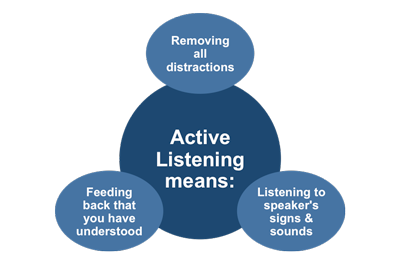A lot of people mistaken coaching as strictly passing on what you know to the player. Through robotic session delivery and long-winded game speeches, coaching can easily become like radio, transmitting only, never receiving.
When coaching, the flow of information has to be bi-directional, regardless of the age, gender or level.
Players have something to say and if you're not listening, you're missing out on very important indicators when it comes to assessing your group.
Stopping to listen is not a sign of weakness, but failing to listen is. Allowing information to flow back to you and processing it properly will deepen your understanding of what your doing and strengthen the level of trust with your players. It will raise your level of understanding with respect to the age and level you are working with. (By using the information available through LTPD resources, you can build off the information already compiled by others.)
Before we proceed, consider your body language when listening. Just as body language is important when communicating, it's important when you're listening too. Make sure you're body language says "I'm listening".
Your antennae should always be up and on, but it may not be habit just yet. When are specific times you might want to ensure you hear what your players are saying?
- Before training
- During exercises
- In between exercises
- After training
- Before, during and after matches

YOU have to start the conversation and sincerely show your players it's safe to speak. By using the Guided Discovery and Question/Answer teaching styles you can draw the answers out of your players and make it more comfortable for them to speak in your environment. You have to also ensure a safe environment from teammates who might mock or belittle players when they have something to say.
Stopping to listen is not a sign of weakness,
but failing to listen is...
Information you can gather from your players regarding your sessions:
- Is the organization working?
- Are they understanding it?
- Are they enjoying it?
- Do they have a better idea or an adjustment to improve it?
- Are they physically/technically/mentally able to do or continue doing it?
- Do you have the right people in the right places?
- Does somebody want an opportunity to do more?
Here is an experiment for you to get young players talking. Coach a very young team for a session and do your thing.
When you speak to them, go down on one knee to their level and watch how quickly they change when speaking to you. Then stand back up and see if they change again. As soon as they can see you're listening they will tell you everything.
When you speak to them, go down on one knee to their level and watch how quickly they change when speaking to you. Then stand back up and see if they change again. As soon as they can see you're listening they will tell you everything.
Your coaching position and environment also contribute to your ability to listen. Outdoors, you should consider the wind, the size of the area you are using and noise from nearby sources. Indoor, if you are in a multi-field complex and there are 2-4 sessions happening, there is a lot of noise. If you're in a gym you should ask parents to stand outside because their chatting echoes in a gym. If it's a multi-area gym ... good luck! The age you are working with also effects where you should be when it comes time to listen. Adjust accordingly to hear what they are saying.
If it's not part of our toolbox, make a focused effort to listen more and listen better. You might even want to specifically write that in your session plan as a reminder.
As a former assistant coach said to me "There is a reason why God gave us two ears and only one mouth."
P.S. Don't be afraid to encourage and help your players use soccer lingo when talking about the game. Just as we want people to be literate in their professions, athletes should know how to speak the language of their sport.
Good article on Listening http://nlp-leadership-coaching.com/applying-the-three-levels-of-listening-to-your-coaching/
